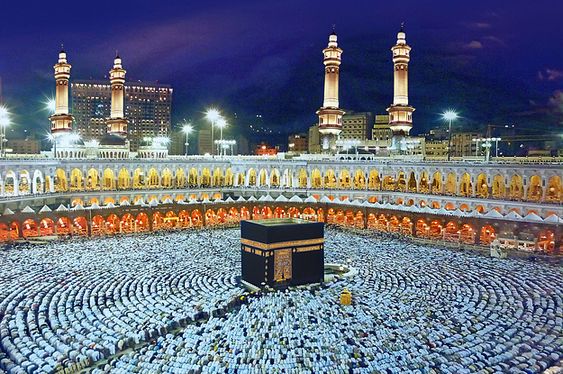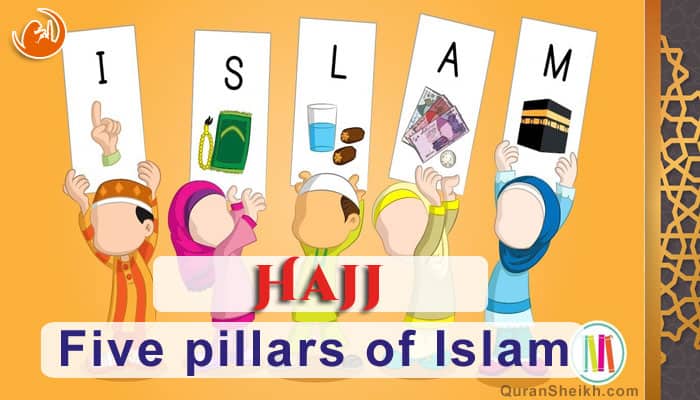#05 Hajj – Fiver Pillars of Islam
5. Al Hajj
Al Hajj Definition:
Literally, Hajj means to intend or to intend to visit. In Shari’ah, Hajj is the act of going to the House of Allah, circumambulating the Ka’bah, and staying in the field of Arafat in order to perform the necessary acts of worship and rituals in certain ways at certain times.
The consensus of the Ummah is that it is obligatory to perform Hajj on every Muslim who has enough money once in a lifetime. Also, Hajj is one of the five pillars of Islam.

Allah Almighty says about its obligation in the Noble Quran:
وَلِلّٰهِ عَلَى النَّاسِ حِجُّ الۡبَيۡتِ مَنِ اسۡتَطَاعَ اِلَيۡهِ سَبِيۡلًا ؕ وَمَنۡ كَفَرَ فَاِنَّ اللّٰهَ غَنِىٌّ عَنِ الۡعٰلَمِيۡنَ ۞
And [due] to Allah from the people is a pilgrimage to the House – for whoever is able to find thereto a way. But whoever disbelieves – then indeed, Allah is free from need of the worlds. (Al-e-Imran: 97)
Millions of Muslims from around the world gather annually in Mecca in anticipation of Hajj, which follows the actions of the Prophet Muhammad 1,377 years ago. Taking part in the pilgrimage at least once in one’s lifetime is a major obligation for all able-bodied Muslims of financial means, and between two and three million people participate in the six-day ritual every year.
Hajj occurs in the 12th month of the Islamic lunar calendar, called Dhul-Hajjah, between the eighth and 13th days of the month.
While the specific rituals carried out by Muslims today date back to the Prophet Muhammad’s “farewell pilgrimage” in 632 AD, traveling to Mecca was a sacred annual rite for Arabian tribes centuries before the advent of Islam.
According to Islamic tradition, the Kaaba – a black silk-clad stone structure at the heart of the Grand Mosque in Mecca – was built by the Prophet Abraham in biblical times.
And it is narrated by Hazrat Abu Huraira (Allah be pleased with him) that: Allah’s Messenger (peace be upon Him) addressed us and said: O people, Allah has made Hajj obligatory for you; so perform Hajj. Thereupon a person said: Messenger of Allah, (is it to be performed) every year? He (the Holy Prophet) kept quiet, and he repeated (these words) thrice, whereupon Allah’s Messenger (peace be upon Him) said: If I were to say” Yes,” it would become obligatory (for you to perform it every year) and you would not be able to do it.
Then he said: Leave me with what I have left to you, for those who were before you were destroyed because of excessive questioning, and their opposition to their apostles. So when I command you to do anything, do it as much as it lies in your power and when I forbid you to do anything, then abandon it. (Sahih Muslim: 1337)
Allah, may He be glorified and exalted, imposed various acts of worship on His creatures with His wisdom, so that He may test them as to who is doing good deeds and who is on the straight path because human beings are different from one another.
Some people like to stand, which is a form of worship, and they accept it because it is worthy of them, and they do not accept other kinds of worship because they do not like it. You will see that he is very fast and obedient in the first type of worship (to stand for the sake of Allah), he is obedient, but he is slow in any other type of worship and that is a burden for him. But the true believer tries to please Allah Almighty. He submits to God, not to his own desires.
There are different types of acts of worship in Islam. Some of them are just acts of worship that require physical activity, such as prayer. and There are some acts of worship that a human body performs, but they are meant to avoid things that are dear to the soul and to which the soul is inclined, such as fasting. And some acts of worship are financial, such as zakat, and some are both financial and physical.
Therefore, Hajj involves both financial and physical acts of worship. since Hajj requires travel and fatigue instead of other acts of worship, so Allah has made this act of worship obligatory only once in a lifetime.
But Allah has made it obligatory on those people who are able to do perform this worship. This is not obligatory on all Muslims like Salah is necessary for all the Muslims.
But the condition of being able to perform Hajj was more important than the rest of the acts of worship, so the condition has been laid down.
Benefits of Hajj:
there are many great benefits of Hajj, some of which are explained below:
Hajj is one of the most important pillars of Islam. The religion of Islam is not complete without it. This is a sign of its importance and love for God Almighty.

This is a kind of jihad in the way of Allah, so Allah Almighty mentions it after the verses of jihad.
It was narrated that ‘Aishah said:
“I said: ‘O Messenger of Allah, is Jihad obligatory for women?’ He said: “Yes: Upon them is a Jihad in which there is no fighting: Al-Hajj and Al-‘Umrah.” (Sunan ibn Majah: Hadith 2901)
A person who performs Hajj according to the Sunnah in a lawful manner receives a great reward.
It was narrated from Ibn ‘Umar that the Prophet (peace be upon Him) said:
“The one who fights in the cause of Allah, and the pilgrim performing Hajj and ‘Umrah are a delegation to Allah. He invited them, so they responded to Him, and they ask Him and He gives to them.” Sunan ibn Majah Hadith 2893)
It refers to the remembrance of Allah and His reverence and the motto of Allah, such as the Talbiyah, the circumambulation of the House of Allah, and running between Safa and Marwah, and the staying in the field of Arafat, and spending the night in Muzdalifah.
Pebbles are stoned. there is dhikr and takbeer and respect of Allah Almighty in it.
During the Hajj, Muslims from all over the world gather and exchange love and affection with each other and introduce each other, during hajj every person is encouraged to do good with his Muslim brother. All that is gained from Hajj is religious and worldly good, and Muslims exchange good things with each other.
Allah Almighty says in the Noble Quran: وَاَذِّنۡ فِى النَّاسِ بِالۡحَجِّ يَاۡتُوۡكَ رِجَالًا وَّعَلٰى كُلِّ ضَامِرٍ يَّاۡتِيۡنَ مِنۡ كُلِّ فَجٍّ عَمِيۡقٍ ۞ لِّيَشۡهَدُوۡا مَنَافِعَ لَهُمۡ وَيَذۡكُرُوا اسۡمَ اللّٰهِ فِىۡۤ اَ يَّامٍ مَّعۡلُوۡمٰتٍ عَلٰى مَا رَزَقَهُمۡ مِّنۡۢ بَهِيۡمَةِ الۡاَنۡعَامِ ۚ فَكُلُوۡا مِنۡهَا وَاَطۡعِمُوا الۡبَآئِسَ الۡفَقِيۡـرَ ۞ And proclaim to the people the Hajj [pilgrimage]; they will come to you on foot and on every lean camel; they will come from every distant pass. That they may witness benefits for themselves and mention the name of Allah on known days over what He has provided for them of [sacrificial] animals. So eat of them and feed the miserable and poor. (Al-Hajj: 27-28)
Hajj is an important duty and worship of Islam which is full of treasures of wisdom which can be a source of pride for man in this world and in the world hereafter. Therefore, Hajj is a once-in-a-lifetime obligation on every Muslim who is able to reach it.
Hajj became obligatory in the year nine or ten AH. One of the major benefits of Hajj is that one can purify oneself from worldly luxuries because of it, as It was narrated that Abu Hurairah said:
“The Messenger of Allah said: ‘Whoever performs the pilgrimage to this House and does not Yarfuth (utter any obscenity or commit sin), will go back as (on the day) his nother bore him. (Sunan an-Nasa’i 2627)
Also, “It is narrated from Abu Hurairah that the Prophet (peace be upon Him) said:
“From one ‘Umrah to another is an expiation for the sins that came in between them, and Hajj Mabrur (an accepted Hajj) brings no less a reward than Paradise.” (Sunan ibn e Majah: Hadith 2888).
But this great reward is for the fortunate servant who performs Hajj or Umrah in the light of Shariah principles and rules. Surely, he will return to his homeland after being cleansed as a result of the greatness of this house and the blessings of the prayers here. the main purpose of the revelation of the prophets is to purify human beings, to purify them from internal diseases and defects, and to raise them to moral heights.
One of the major means of purification of the heart and mind is the observance of prayers, paying Zakat, fasting, and performing Hajj according to shariah rules. So when a pilgrim raises the Talbiyah in clothes of ihram:
لَبَّيْكَ ، اَللّٰهُمَّ لَبَّيْكَ ، لَبَّيْكَ ، لَا شَرِيْكَ لَكَ لَبَّيْكَ
“Here I am [at your service] O God, here I am. Here I am [at your service]. You have no partners (other gods). To You alone is all praise and all excellence, and to You is all sovereignty. There is no partner to You.”
It is as if the hymn of Labeek is a testimony to the divine monotheism and a confession of the greatness of God that we are freeing ourselves from all kinds of polytheism. No one is worthy of worshiping Him except You, and no one is worthy of us to look to Him in our troubles, and no one is worthy to take away any of our troubles. The wisdom in reciting the Talbiyah aloud is to not only accept this monotheism but to proclaim it.

Therefore, one of the important benefits of Hajj is that one should learn to create sincerity and divinity in one’s worship even the Ka’bah of Allah is based on this monotheism. As Allah says in the noble Quran (interpretation of the meaning) when We commanded Ibrahim to build this house so that no one should associate partners with Me, and that the house should be kept clean for those who circumambulate it, those who stay, those who bow and those who prostrate.
Therefore, after the construction of this house, Hazrat Ibrahim called out: O people! Come to this house and Allah carried this call far and wide. Therefore, from that time till today, this house has been inhabited by worshipers in such a way that its example cannot be given anywhere else and every visitor returns with various benefits.
One of the main benefits of Hajj is that Muslims meet each other and try to understand their sorrows and cooperate with each other in doing good deeds and preaching and admonishing each other. It is a matter of guidance that they should spread good deeds among each other so that they may become the source of invitation to Islam.
Because from here the religion of Islam spreads in all over the world and the rays of monotheism shine. Therefore, the pilgrims of the House of Allah should spend their time with the scholars present in the Ka’bah and the Prophet’s Mosque, and the scholars should perform their duty of guiding the people in the best possible way.
These days are for learning and teaching, whether it is staying in Makkah or in Mina, Arafat, or Muzdalifah or visiting the Prophet’s Mosque. Every person should become a beacon of love for his other brothers. In matters of teaching, a person should be humble because arrogance closes the paths of knowledge and the arrogant person loses religious treasures. As the famous obedient Hazrat Mujahid says that knowledge cannot be acquired by those who are ashamed and arrogant. Therefore, men and women should participate in it more and more. In any case, the virtue of acquiring knowledge of religion is so great that the Prophet (peace and blessings of Allah be upon him) said:
“Whoever takes a path upon which to obtain knowledge, Allah makes the path to Paradise easy for him.” ( Jami` at-Tirmidhi 2646)
And a great example of knowledge in a sahih hadeeth. It is narrated Narrated Abu Musa:
The Prophet (peace be upon Him) said, “The example of guidance and knowledge with which Allah has sent me is like abundant rain falling on the earth, some of which was fertile soil that absorbed rainwater and brought forth vegetation and grass in abundance. (And) another portion of it was hard and held the rainwater and Allah benefited the people with it and they utilized it for drinking, making their animals drink from it, and for irrigation of the land for cultivation.
(And) a portion of it was barren which could neither hold the water nor bring forth vegetation (then that land gave no benefits). The first is the example of the person who comprehends Allah’s religion and gets benefit (from the knowledge) which Allah has revealed through me (the Prophets and learns and then teaches others. The last example is that of a person who does not care for it and does not take Allah’s guidance revealed through me (He is like that barren land.)
” ( Sahih al-Bukhari 79)
Therefore, on this occasion of Hajj, one should take full advantage of the knowledge and dissemination of the knowledge of the religion, but the knowledge of the religion means the knowledge which is derived purely from the Noble Qur’an and Sunnah.

One of the major benefits of Hajj is the abundance of Nawafil, recitation of the Holy Quran, Tawaf of Baitullah, and remembrance of the Qur’an. Apply it so that you can increase the good deeds and keep on reciting Tasbeeh and Tahlil while walking and keep on praying frequently with humility. And this is the place where man fulfills his vows which are made for obedience to Allah. Although there is no point in taking a vow. whoever has made a vow of prayer or tawaf or any other act of worship here, he should take advantage of this opportunity and fulfill it during his stay in Makkah.
One of the major benefits of Hajj is to take care of and support as many people as possible from different parts of the world. People who come here can sometimes get into accidents or get in trouble, such as losing someone’s money, getting lost or getting sick, or trying to get help if they don’t have the necessary paperwork. They should not consider themselves lonely and helpless. Instead, one should try to learn a lesson from Hajj so that no one is harmed by anyone, whether it is during Tawaf or staying in Arafat and Muzdalifah or Mina.
If everyone creates a spirit of comfort to others in this way, then everyone will benefit and no one will be harmed and one way of taking care of the needy is also a sacrifice. If a person wants to offer more than the necessary sacrifice which is part of Hajj Tamatu ‘or Qur’an as a supererogatory prayer, then this is the best time for him so that the needy people can get benefit from this meat.
On this occasion, we should pray to Allah Almighty to give us the sincerity of action and depth of religious knowledge, to enable us to recognize and practice the truth through argument, to accept the efforts of all the pilgrims of Baitullah and Return home that their sins have been forgiven and their deeds are full of good deeds.
Conditions of the obligation of Hajj:
The conditions for Hajj to be obligatory are fixed. If those conditions are met, then Hajj will be obligatory, otherwise not.
The conditions of the obligation of Hajj are as follows:
- To be Muslim
- To be an adult
- To be wise
- To be free because Hajj is not obligatory on slaves.
- To be healthy
- Being able to afford travel expenses
- Peace and order along the way
- Don’t be afraid of life
- The woman is not in a state of ‘iddah
- Having a husband or mahram for a woman.
Pillars of Hajj:
According to the opinion of the majority of scholars, Hajj has four pillars, which are:
Ihram: It is the intention of starting the Hajj acts of worship. As it is Narrated by Hazrat ‘Umar bin Al-Khattab (R.A) that I heard Allah’s Messenger (peace be upon Him) saying, “The reward of deeds depends upon the intentions and every person will get the reward according to what he has intended.
So whoever emigrated for worldly benefits or for a woman to marry, his emigration was for what he emigrated for.” (Sahih al-Bukhari 1)
Ihram has a specific timing, within the months of Hajj, which are mentioned in the Quranic verse as:
اَلۡحَجُّ اَشۡهُرٌ مَّعۡلُوۡمٰتٌ ۚ فَمَنۡ فَرَضَ فِيۡهِنَّ الۡحَجَّ فَلَا رَفَثَ وَلَا فُسُوۡقَۙ وَلَا جِدَالَ فِى الۡحَجِّ ؕ وَمَا تَفۡعَلُوۡا مِنۡ خَيۡرٍ يَّعۡلَمۡهُ اللّٰهُ ؕ وَتَزَوَّدُوۡا فَاِنَّ خَيۡرَ الزَّادِ التَّقۡوٰى ۚ وَاتَّقُوۡنِ يٰٓاُولِى الۡاَلۡبَابِ ۞
Hajj is [during] well-known months, so whoever has made Hajj obligatory upon himself therein [by entering the state of ihram], there is [to be for him] no sexual relations and no disobedience and no disputing during Hajj. And whatever good you do – Allah knows it. And take provisions, but indeed, the best provision is fear of Allah. And fear Me, O you of understanding. (Al-Baqarah: 197)
Ihram must start at certain places, which are called the Meeqaats.
Standing at ‘Arafah: The Prophet (peace be upon Him) said: “Hajj is the standing at ‘Arafah. If anyone comes over there before the Fajr Prayer on the night of Al-Muzdalifah, his Hajj will be complete.” [Abu Daawood and others]
The time of standing at ‘Arafah begins from the noon of the ninth day of Dhul-Hajjah until the dawn of the tenth day [An-Nahr (the day of sacrifice)]. It was also said that it begins from the dawn of the ninth day of Dhul-Hajjah.
It should be clear that standing, even for a moment, at any place of ‘Arafah during that time is sufficient, as it is Narrated by Hazrat Urwah ibn Mudarris at-Ta’ I (R.A) that I came to the Messenger of Allah (peace be upon Him) at the place of halting, that is, al-Muzdalifah. I said: I have come from the mountains of Tayy. I fatigued my mount and fatigued myself.
By Allah, I found no hill (on my way) but I halted there. Have I completed my hajj? The Messenger of Allah (peace be upon Him) said: Anyone who offers this prayer along with us and comes over to Arafat before it by night or day will complete his hajj and he may wash away the dirt (of his body). (Sunan Abi Dawud: 1950)
Tawaaf Al-Ifaadhah: Allah The Almighty Says in the Noble Quran:
ثُمَّ لۡيَـقۡضُوۡا تَفَثَهُمۡ وَلۡيُوۡفُوۡا نُذُوۡرَهُمۡ وَلۡيَطَّوَّفُوۡا بِالۡبَيۡتِ الۡعَتِيۡقِ ۞
Then let them end their untidiness and fulfill their vows and perform Tawaf around the ancient House.” (Al-Hajj: 29)
This proves that this Tawaf is a must and one must not leave before performing it. Time of Tawaf Al-Ifaadhah begins after standing at ‘Arafah and Muzdalifah to the end of one’s life according to the opinion of the majority of scholars. Scholars just disagreed whether one must offer a sacrifice if he performed this Tawaf after the Days of Tashreeq (the 11th, 12th, and 13th of Dhul-Hajjah) or the month of Dhul-Hajjah or not.
Sa‘y between the Safa and Marwah Mountains: the prophet (peace be upon Him) said: “Make Sa‘y as Allah The Almighty prescribed it for you.” [Ahmad]
Hazrat Aishah (R.A) also said: “The Prophet peace be upon Him made Tawaf and the Muslims made Tawaaf (i.e. between the Safa and Marwah), so it has become obligatory. May Allah Reject the Hajj of whoever does not make Tawaaf between the Safa and Marwah.” [Muslim]
This is the Sa‘y of Hajj, and it’s time for the one who makes Tamattu‘ Hajj begins immediately after standing at ‘Arafah and Muzdalifah and performing Tawaaf Al-Ifaadhah. As for the one who makes Qiraan Hajj or Ifraad Hajj, it is permissible for him to perform Sa‘y after performing the Arrival Tawaaf.
These four pillars (Ihram, Standing at ‘Arafah, Ifaadhah Tawaaf, and Sa‘y between Safa and Marwah) are a must for the validity of one’s Hajj because they cannot be compensated in any way, neither with sacrifice nor with anything else. Furthermore, observing the sequence in performing these pillars is a condition of their validity. Accordingly, Ihram must be performed first, then standing at ‘Arafah, then Tawaaf Al-Ifaadhah, and then the Sa‘y between Safa and Marwah.
Obligatory Acts of Hajj:
1) Ihram must start at the Shari’ah-approved Meeqaats, as the Prophet (PBUH) set the Meeqaats and said: “Narrated Ibn `Abbas:
The Prophet (peace be upon Him) fixed Dhul-Hulaifa as the Miqat for the people of Medina, Al-Juhfa, for the people of Sham, Yalamlam for the people of Yemen, and Qarn for the people of Najd. And these Mawaqit are for those living at those very places, and besides them for those who come through those places with the intention of performing Hajj and Umra, and whoever is living inside these places can assume lhram from his own dwelling place, and the people of Mecca can assume lhram from Mecca. (Sahih al-Bukhari 1529)
2) Standing at ‘Arafah until sunset for those who stood during the day as the Prophet (peace be upon Him) did so and said: “Learn your rituals (by seeing me performing them), for I do not know whether I would be performing Hajj after this Hajj of mine. (Sahih Muslim 1297)
3) Spending the night at Al-Muzdalifah on the night of An-Nahr (night of the tenth day of Dhul-Hajjah) is obligatory according to the opinion of the majority of scholars.
Additionally, the Prophet (peace be upon Him) allowed the weak people to leave Al-Muzdalifah after midnight, which proves that spending the night there is obligatory. Moreover, Allah The Almighty Commanded the pilgrims to remember Him at Al-Mash‘ar Al-Haraam.
It is permissible for the weak people, children, and women who cannot endure the overcrowdedness, to head to Mina at the end of the night to cast the pebbles before the arrival of all people. Ibn ‘Abbaas (R.A) said: “I was among the weak people of the family of the Prophet whom he allowed to proceed from Al-Muzdalifah to Mina before dawn.” [Al-Bukhari and Muslim]
A’ishah (RAA) narrated, ‘The Prophet sent Umm Salamah on the night of the 10th (before the day of the Sacrifice) and she threw her pebbles before dawn, after which she returned to Makkah to perform Tawaf.’’ Related by Abu Dawud (Bulugh al-Maram 757)
4) Spending the nights of the Days of Tashreeq at Mina as the Prophet (peace be upon Him) did so and said: “Learn how to perform your rituals from me.” The Prophet (Peace be upon Him) also gave permission to his uncle Al-Abbass (R.A) to spend the night at Makkah to provide the pilgrims with water. He also allowed the camel herds not to spend the night at Mina, which proves that it is obligatory as long as there is no excuse.
5) Stoning the Jamaat: Jamrat (stone of) Al-‘Aqabah must be stoned on the Day of ‘Eid and then stone the three Jamaat (stone pillars) during the Days of Tashreeq because the Prophet (peace be upon Him) did so. In addition, Allah The Almighty Says (what means):
وَاذۡكُرُوا اللّٰهَ فِىۡٓ اَيَّامٍ مَّعۡدُوۡدٰتٍؕ فَمَنۡ تَعَجَّلَ فِىۡ يَوۡمَيۡنِ فَلَاۤ اِثۡمَ عَلَيۡهِ ۚ وَمَنۡ تَاَخَّرَ فَلَاۤ اِثۡمَ عَلَيۡهِ ۙ لِمَنِ اتَّقٰى ؕ وَاتَّقُوا اللّٰهَ وَاعۡلَمُوۡٓا اَنَّکُمۡ اِلَيۡهِ تُحۡشَرُوۡنَ ۞
And remember Allah during [specific] numbered days. Then whoever hastens [his departure] in two days – there is no sin upon him; and whoever delays [until the third] – there is no sin upon him – for him who fears Allah. And fear Allah and know that unto Him you will be gathered. (Al-baqarah: 203)
Stoning the Jamraat is considered remembrance of Allah The Almighty as the Prophet (PBUH) said: “Tawaaf around Baitullah (the Kaaba), between the Safa and Marwah and stoning the Jamraat, have been prescribed to establish the Remembrance of Allah.” [Abu Daawood and others]
6) Cutting hair or shaving head: The Prophet (peace be upon Him) commanded pilgrims to do so saying: “…then cut short his hair and end (the state of) his Ihram…” [Al-Bukhari and Muslim] The Prophet (peace be upon Him) also supplicated thrice for those who shave their heads and once for those who shorten their hair.
7) Farewell Tawaaf: The Prophet (peace be upon Him) said: “The last thing that one of you should do before leaving is to circumambulate Al-Bayt (the Kaaba).” [Muslim]
Hazrat Ibn ‘Abbaas (R.A) said: “The Prophet commanded pilgrims that the last thing they should do in Makkah is to circumambulate Al-Bayt (the Kaaba), but he exempted menstruating women.”
Leaving any of these obligatory acts does not invalidate one’s Hajj, but one must offer a sacrifice (a sheep, one-seventh of a she-camel, or a cow) to make up for it. This sacrifice must be slaughtered in Makkah and distributed among the poor people of Al-Masjid Al-Haraam.
Yahya related to me from Malik from Abu Bakr ibn Nafi from his father that the daughter of one of Safiyya bint Abi Ubayd’s brothers was bleeding after she had given birth to a child at Muzdalifa. She and Safiyya were delayed and did not arrive at Mina until after the sun had set on the day of sacrifice.
Abdullah ibn Umar told them both to stone the jamra at the time they arrived and he did not think that they owed anything. Yahya said that Malik was asked about someone who forgot to stone one of the jamras on one of the days of Mina until it was evening and he said, “He should throw the stones at whatever time of day or night he remembers, just as he would pray the prayer if he forgot it and then remembered it at any time of day or night.
If he remembers (that he has not done the stoning) after he has returned to Makkah, or after he has left, he must sacrifice an animal.” (Muwatta Malik Hadith 229)
How to perform Hajj (a step by step guide):
There are several different ways of performing it, and numerous schools of Islamic thought, between which lie many scholarly differences. Here is a breakdown of the steps included in performing hajj.
Hajj Day 1
Enter in ihram state (the sacred state)
The very first rite of Hajj is entering ihram – a pilgrim’s sacred state – when crossing the outer boundaries of Mecca, called Miqat. On the eighth of Dhul-Hajjah, pilgrims enter ihram, which entails wearing plain garments – two unstitched cloths for men, or loose-fitting clothing for women – as well as following certain rules, such as not giving in to anger or engaging in sexual activity.
Head to Mina, a sprawling tent city:
The pilgrims then travel from Mecca to the sprawling tent-city of Mina, whether by foot along pilgrim paths or by buses and cars. It is an 8 km journey.
The pilgrims will spend the day in Mina, only setting out the next morning at dawn. Most of the time in Mina is spent in prayer and remembering Allah.
Hajj Day 2
Spend the day at Arafat
The Day of Arafat is considered one of the most important days, not just of Hajj, but of the Islamic calendar. Mount Mercy at Arafat was the scene of the Prophet Muhammad’s final sermon. After making the 14.4 km journey from Mina, pilgrims spend the day here in reverent prayer.
Elsewhere in the world, many Muslims choose to fast on this day.
Collect pebbles at Muzdalifah:
After sunset, its time to move again, this time to Muzdalifah – a 9 km trip – where they spend the night under the stars. Many will also begin collecting pebbles here for tomorrow’s rites, departing again just before sunrise. Pilgrims gather at Mount Arafat for key rite
Hajj Day 3
Throw stones at the pillars
For those performing Hajj, the day is known as yawm-ul hajj al-Akbar (The big hajj day) and is probably the longest day of the pilgrimage, and the most dangerous. The 10th of Dhul-Hajjah is Eid al-Adha, a day celebrated by Muslims around the world as the greater of the two Muslim holidays.
Pilgrims start the day in Muzdalifah and begin heading back to Mina before dawn. Once in Mina, they perform the first rami, throwing seven pebbles at the largest of three columns known as Jamarat.
This act is a symbolic stoning of the devil, based on historical tradition. Allah Almighty told this to His Prophet Hazrat Ibrahim to sacrifice his son, the story goes, as proof of faith. It is believed that at this spot in Mina, the devil appeared and tried to dissuade Hazrat Ibrahim (A.S) from heeding the command. Hazrat Ibrahim (R.A) responded by throwing stones to scare him off.
Millions of pilgrims converge at the Jamarat Bridge, which houses the three columns representing the devil, in order to re-enact the story.
The bridge has been the sight of deadly stampedes in the past, with around 350 people being crushed to death in 2006. But in recent years, the event has taken place without major incident.
After casting their stones, pilgrims must perform the sacrifice. Completing the story, when the Prophet Abraham (A.S) went to sacrifice his son, he found God had placed a ram there to be slaughtered instead. Pilgrims thus must slaughter a sheep, goat, cow, or camel – or more likely, pay for it to be done in their names.
At this point, pilgrims trim or shave (men only) their hair and remove their ihram clothes. Many will then proceed to Mecca to perform tawaf and sa’ee, first circling the Kaaba seven times, then walking seven times between the hills of Safa and Marwa.
When all is finally done, they return to their campsite in Mina.
Hajj Day 4 and 5
Hajj Final days in Mina
On each day, they will again symbolically stone the devil – this time throwing seven pebbles at each of the three pillars. With the hardest part behind them, pilgrims will now spend the next two or three days in Mina.
When their time in Mina is finished, the pilgrims return to Mecca to perform the final circulation of the Kaaba, a “farewell” tawaf.
Before heading home, many also go to Medina, the second holiest city in Islam, where the Prophet Muhammad (Peace be upon Him) is buried along with his closest companions. Visiting Medina, however, is not part of the pilgrimage.








